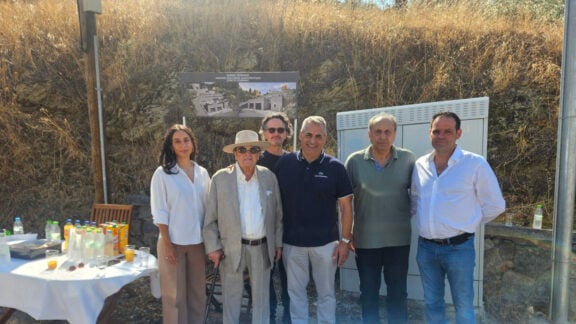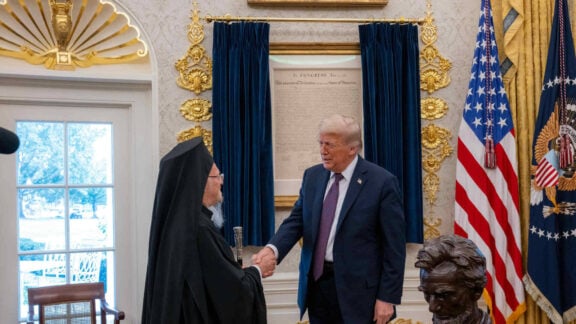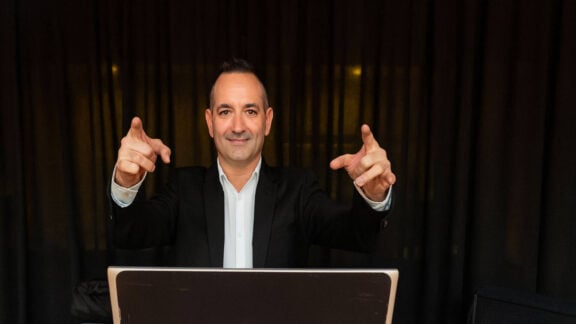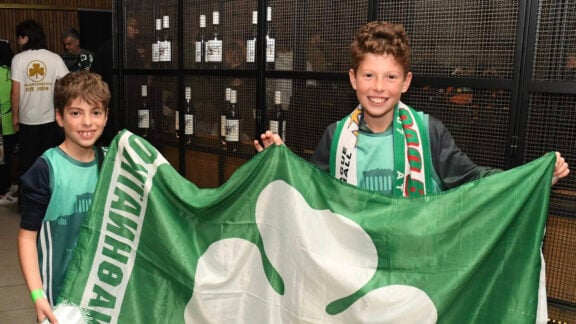It was at the Royal Military College in Canberra that Ashley Perry first learned about the bloody and disastrous Battle of Crete, 20 May 1941.
The battle that saw the first mainly airborne assault ever conducted in modern warfare, where the German paratroops were used in a large scale, tackled the attention of the Horsham born artillery officer long before he married Greek Australian Sophie – which enhanced his connection to the Hellenic Republic.
“The reason I had an affinity for the campaign was not that it was totally unknown – but because it was harrowing and because it happened before America got involved in the war. I felt that things like ANZAC day, the events of Gallipoli and of Kokoda had become quite powerful, but for some reason the events in Crete and Greece were neglected,” Ashley Perry tells Neos Kosmos.
In purely military terms, as Ashley explains, there was an interest there because of the use of airborne force by Germans, who were the forerunners of modern warfare. Despite the Allies’ defeat, the battle will be remembered as one of the strongest acts of defiance against the Nazi aggressor that was a military defeat in some respect on both sides – for defenders – ANZAC soldiers and Greeks, and invaders – the Nazi Germans.
“Germans could have done it in a different way and they would have lost less troops, while securing Crete. But they chose to do it in a spectacular way, that came at such a great cost that Hitler and the Germans decided to never do it again. Many Commonwealth forces – Australian, British and New Zealand troops – fought with their Cretan allies in the great battle, many of them were captured, and some of them didn’t see their homeland till 1945.”
Alongside two other collaborators, independent filmmaker Miklos Janek and communication designer Michael Dunbar, Ashley Perry is now crowdfunding via pozible.com website, seeking donations to bring to the screen the forgotten story, in the first feature-length documentary about the Battle of Crete.
For the Australian former artillery officer turned filmmaker, who served the army through the ’90s before resigning to pursue his filmmaking career, it is the connection of his military background knowledge with his love for cinema studies that seem a good recipe to give the documentary a fair approach.
Now communications and cinema studies tutor at the School of Media and Communication at RMIT University, Perry says with his documentary Battle Island Crete he wants to examine all dimensions of what happened in Crete – the Australian, New Zealand and British involvement in the defence of Crete – while revealing the many acts of bravery and sacrifice made by the local Cretan community.
“My feeling was it would be good to reexamine the events on Crete in a film, and from my perspective a feature-length film might give us enough time to look at all the protagonists, while focusing on the people of Crete. They are the ones who lived with the consequences afterwards – the occupation of Crete was a traumatic and dangerous period for the locals. There are many short and propaganda films on the Battle of Crete, but not a feature-length documentary,” Perry says.
“Our intention is to photograph the battlefield terrain as it exists today, and supplement this footage with archival imagery and possible eyewitness accounts of Australian and New Zealand soldiers. Ideally, on Crete, we would like to locate people who could remember the events. Voice-over narration will be used throughout the film.”
The current production budget for the movie is $17,000, self-financed by the three-member crew. In order to travel to Crete to undertake filming, during five weeks in May next year, a further $14,000 is required. In the four weeks since the campaign started in October, the film crew has already come half-way, with over $10,000 raised.
Perry tells Neos Kosmos the support of wider Greek and Cretan communities has been positive so far, with MPs Jenny Mikakos, John Pandazopoulos and Lee Tarlamis, and the President of the World Council of Cretans, Tony Tsourdalakis, providing their support and advice. It was the Sydney family, Perry says, of Dr Chris and Mary Papastavros, that provided important and generous financial support even before the crowdfunding campaign took off.
“After the completion of Battle Island Crete, planned for October 2014, the film will be submitted for competition in both local and international film festivals, including the Melbourne International Festival. We’ll also plan to reconfigure it into two one-hour television series.”
The crowdfunding campaign for the documentary Battle Island Crete finishes in mid-December. To support and donate, visit www.pozible.com/project/26834
For more information about the movie, check the Facebook page Battle Island Crete, or contact Ashley Perry via email battleislandcrete@gmail.com
Advertisement
Battle of Crete on screen
An Australian former artillery officer turned filmmaker is creating the first feature-length documentary on the bravery, resistance and sacrifice of the Battle of Crete






